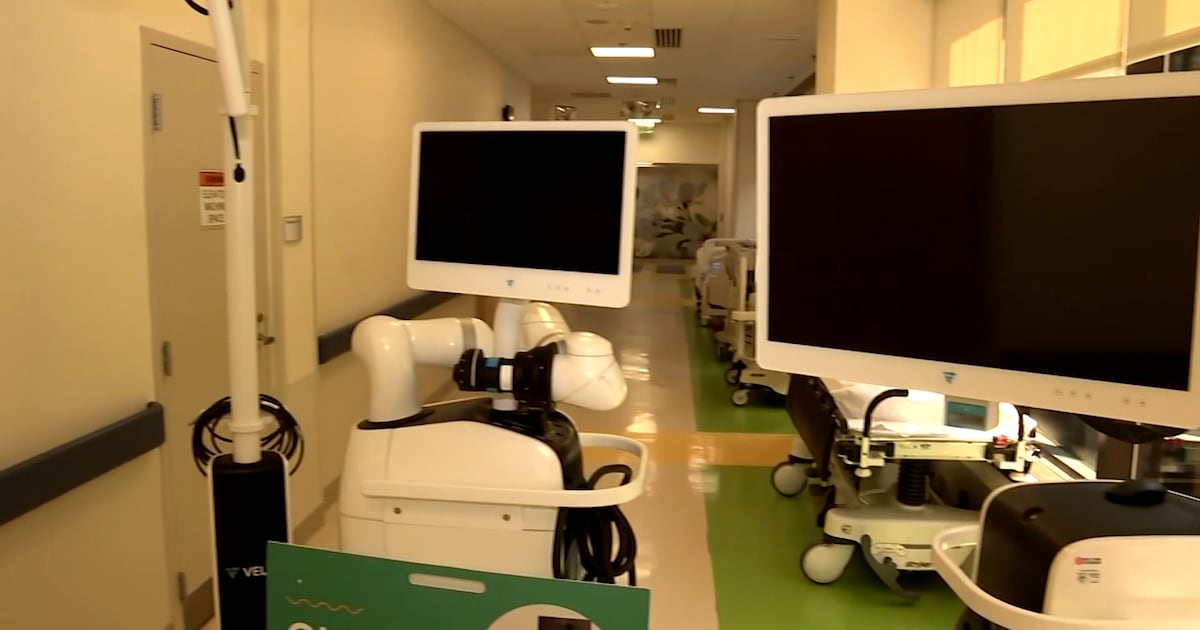Science
Groundbreaking Robot Revolutionizes Spinal Surgery at Nemours Hospital

A pioneering medical robot is assisting doctors at Nemours Children’s Hospital in Philadelphia, Pennsylvania, to enhance the precision and efficiency of spinal surgeries. This innovative technology is designed to improve patient outcomes by facilitating quicker recovery times and reducing surgical risks.
Among the first patients to benefit from this advanced robotic system is Rhiannon Groff, a 16-year-old high school student diagnosed with scoliosis, a condition characterized by an abnormal curvature of the spine. Under the guidance of Dr. Brett Shannon, Groff underwent a novel spinal surgery aimed at alleviating her chronic pain. “I would have a lot of soreness and aching, especially in my lower back,” Groff explained, highlighting the challenges she faced before the procedure.
The surgery involved the placement of rods secured by screws, which must be accurately positioned to avoid damage to surrounding vital structures, such as lungs, blood vessels, and nerve roots. “It’s important to make sure that they’re placed exactly in the bone rather than outside,” Dr. Shannon noted. The new robotic system significantly enhances this precision, allowing surgeons to perform the procedure more quickly and accurately.
Robotic Assistance Enhances Surgical Precision
Nemours Children’s Hospital stands out as the first facility on the East Coast to implement this state-of-the-art spinal robot. According to Dr. Suken Shah, the technology elevates surgical capabilities to a new level, providing enhanced imaging that allows surgeons to visualize the intricate three-dimensional geometry of the spine.
The robot’s advanced imaging technology assists in accurately pinpointing the locations for screw insertion, which is crucial for avoiding complications. By ensuring that screws are inserted with millimeter precision, the system minimizes the risk to nearby vital structures.
Groff reported significant improvements following her surgery. “There’s no more pain two months after the surgery,” she stated, expressing her enthusiasm for the technology. “When I first heard that it was going to be assisted by a robot, I honestly thought it was really cool. I’m so glad that it’s helping people like me and those with more serious conditions recover and get better.”
Expanding Surgical Applications
The team at Nemours is not only focused on scoliosis surgery but is also utilizing the robotic system for a variety of spinal procedures. This innovative approach has the potential to redefine standards in spinal surgery, offering hope for improved recovery experiences for countless patients.
As Groff prepares to return to her track team, ready to run pain-free, the implications of this technology extend beyond individual cases. The introduction of robotic assistance in surgeries represents a significant advancement in the field of medicine, promising better outcomes for patients requiring spinal interventions.
As more hospitals consider adopting similar technologies, the future of spinal surgery is poised for transformation, ensuring that patients receive the highest level of care with safety and efficiency at the forefront.
-

 Science3 months ago
Science3 months agoToyoake City Proposes Daily Two-Hour Smartphone Use Limit
-

 Top Stories3 months ago
Top Stories3 months agoPedestrian Fatally Injured in Esquimalt Collision on August 14
-

 Health3 months ago
Health3 months agoB.C. Review Reveals Urgent Need for Rare-Disease Drug Reforms
-

 Technology3 months ago
Technology3 months agoDark Adventure Game “Bye Sweet Carole” Set for October Release
-

 World3 months ago
World3 months agoJimmy Lai’s Defense Challenges Charges Under National Security Law
-

 Lifestyle3 months ago
Lifestyle3 months agoVictoria’s Pop-Up Shop Shines Light on B.C.’s Wolf Cull
-

 Technology3 months ago
Technology3 months agoKonami Revives Iconic Metal Gear Solid Delta Ahead of Release
-

 Technology3 months ago
Technology3 months agoApple Expands Self-Service Repair Program to Canada
-

 Technology3 months ago
Technology3 months agoSnapmaker U1 Color 3D Printer Redefines Speed and Sustainability
-

 Technology3 months ago
Technology3 months agoAION Folding Knife: Redefining EDC Design with Premium Materials
-

 Technology3 months ago
Technology3 months agoSolve Today’s Wordle Challenge: Hints and Answer for August 19
-

 Business3 months ago
Business3 months agoGordon Murray Automotive Unveils S1 LM and Le Mans GTR at Monterey









